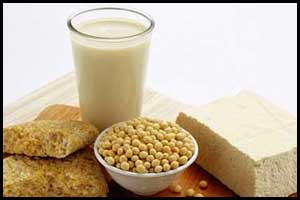- Home
- Editorial
- News
- Practice Guidelines
- Anesthesiology Guidelines
- Cancer Guidelines
- Cardiac Sciences Guidelines
- Critical Care Guidelines
- Dentistry Guidelines
- Dermatology Guidelines
- Diabetes and Endo Guidelines
- Diagnostics Guidelines
- ENT Guidelines
- Featured Practice Guidelines
- Gastroenterology Guidelines
- Geriatrics Guidelines
- Medicine Guidelines
- Nephrology Guidelines
- Neurosciences Guidelines
- Obs and Gynae Guidelines
- Ophthalmology Guidelines
- Orthopaedics Guidelines
- Paediatrics Guidelines
- Psychiatry Guidelines
- Pulmonology Guidelines
- Radiology Guidelines
- Surgery Guidelines
- Urology Guidelines
Soy protein lowers Low-density lipoprotein cholesterol and CVD risk

St. Michael's Hospital researchers in Toronto have found that Soy protein has the ability to lower total cholesterol and Low-density lipoprotein by a small but significant amount. The study has appeared in The Journal of Nutrition.
Certain plant foods (nuts and soy protein) and food components (viscous fibres and plant sterols) have been permitted by the FDA to carry a heart health claim based on their Low-density lipoprotein cholesterol-lowering ability.
"When one adds the displacement of high saturated fat and cholesterol-rich meats to a diet that includes soy, the reduction of cholesterol could be greater," Dr Jenkins the lead author of the study, said. "The existing data and our analysis of it suggest soy protein contributes to heart health."
The researchers at St. Michael's set out to provide a meta-analysis of 46 existing trials that evaluated soy and determine whether the proposed move aligns with existing literature.
Of the 46 trials, 43 provided sufficient data for meta-analysis. Forty-one trials examined the protein's effects on low-density lipoprotein (LDL) cholesterol, which is often referred to as the "bad cholesterol" because a high amount of it leads to a build-up of cholesterol in arteries. All 43 studies provided data about "total cholesterol," which reflects the overall amount of cholesterol in the blood.
Researchers found that soy protein reduced LDL cholesterol by three to four percent in adults -- a small but significant amount, noted Dr. David Jenkins.
A limitation of this study was that it exclusively analyzed the 46 trials the FDA had referred to previously, as opposed to casting a wider net.
Dr Jenkins and his team hope that this work is taken into account in the FDA's current evaluation of soy protein as it pertains to heart health.
"We hope the public will continue to consider plant-based diets as a healthy option," Dr. Jenkins said. "It is in line with Health Canada's recently released Food Guide, which emphasizes plant protein food consumption by Canadians."
Dr David Jenkins has previously consulted for and received research funding from soy food companies and the United States Soy Institute.

Disclaimer: This site is primarily intended for healthcare professionals. Any content/information on this website does not replace the advice of medical and/or health professionals and should not be construed as medical/diagnostic advice/endorsement or prescription. Use of this site is subject to our terms of use, privacy policy, advertisement policy. © 2020 Minerva Medical Treatment Pvt Ltd